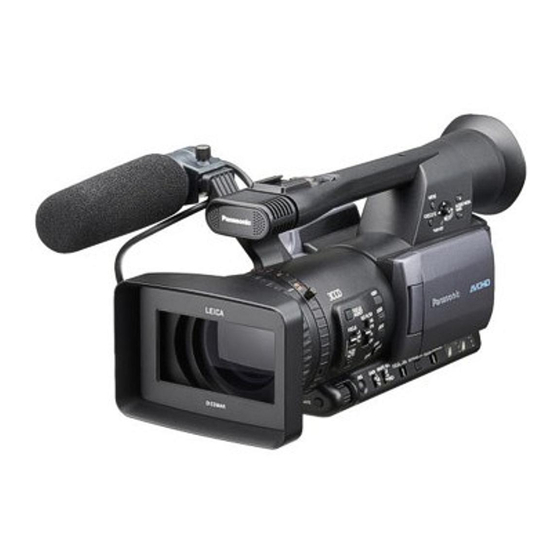Introduction
is document will introduce you to using the
Panasonic AG-HMC150, a high de nition (HD)
camcorder with many advanced features that were
not-so-long-ago only available on high-end cameras.
ese features include a full HD (1920 x 1080) and
the ability to record progressive scan video in either
30P or 24P. e camera records to SDHC memory
cards using the AVCCAM video codec. e camera
sports many professional features
including: a waveform monitor,
cine gamma, scene le controls,
XLR audio inputs with phantom
power, and a smooth servo
zoom.
e HMC150 is a good learning
tool if you're interested in
working with prosumer and
professional cameras, as it has all of the settings and
capabilities commonly found in prosumer and
professional cameras from Sony and Panasonic, so
much of what you learn using this camera is
applicable to other cameras as well.
What's in the camera bag?
When you check out a AG-HMC150 from Tech
Central at MassArt or are using a camera provided in
class, you get a complete kit: the camera, owner's
manual, a charger/power adapter (for charging the
battery or powering the camera using a wall outlet),
A/C cable for the charger/power adapter, a cable that
connects from the charger/power adapter to the
camera, a short shogun microphone, a foam
windscreen, headphones, and two batteries.
Panasonic is special among camcorder manufacturers as
they were the rst to introduce a prosumer camcorder
with true progressive scan video (either 24P or 30P) that
could be con gured to produce a look that resembles lm.
The rst of these cameras was the DVX100 introduced in
2002, it recorded an SD video onto DV tape and quickly
became popular among independent lmmakers because
of its lm look. Today the AG-HMC150 and it's kin carry on
this tradition. Excellent cameras are also available from
Sony and other manufacturers. Most of the differences
between cameras boils down to speci c technical
characteristics, features, and ergonomics, but all prosumer
cameras on the market produce excellent images.
Introduction to the Panasonic AG-HMC150 AVCHD camcorder (rough draft)
Using the camera the rst time
1. e rst thing you want to do is take the camera
out of the bag and check it to make sure there is
nothing obviously wrong with it. Note: e clacking
noise you hear when you move the camera around
while turned off is a component of the image
stabilization system, there's nothing wrong with the
camera. Turn it on and the clicking goes away.
2. Next you will
want to insert the
Refer to the
battery by facing
glossary at the end
the contact side
of this document
towards the back of
for the de nition of
the camera with the
any technical terms
contact side down
you come across
and then pushing it
that you're not
into place and then
familiar with.
slide down to lock.
Don't force the
battery, if you have trouble inserting the battery try
rotating it, it might be upside down. Panasonic
model VW-VBG260 or VW-VBG6 batteries may be
used.
3. Verify an SD card installed. SD cards are very
sensitive to static discharge, so handle these carefully
in the event you need to remove one from the camera
or insert one into the camera by making sure you
have touched something to ground yourself while
holding the camera and avoid touching the contacts.
4. Push the "Auto" button to switch to auto
recording mode. e button is located on the side of
the camera under the LCD panel. e Camera
controls the following settings when in auto mode:
Focus; Iris; Gain; and White Balance. For starters,
let's allow the camera to take care of these settings.
For any serious shooting we'll want to take care of
these settings manually.
http://kino-eye.com/dvb/
3 / 35

